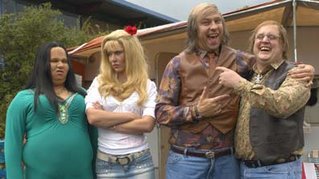Simon Pegg on British and American Humour
 Whilst living in Britain I would frequently hear the remark that British humour is 'different' than American humour, and then get surprised glances when I (an American) appeared to 'get'/dish out a clever bit of irony (don't misunderstand, I'm not that clever). I was always puzzled by this, as I merely thought it was the interpretation, filtered by cultural context, that determined whether someone got the laugh or not.
Whilst living in Britain I would frequently hear the remark that British humour is 'different' than American humour, and then get surprised glances when I (an American) appeared to 'get'/dish out a clever bit of irony (don't misunderstand, I'm not that clever). I was always puzzled by this, as I merely thought it was the interpretation, filtered by cultural context, that determined whether someone got the laugh or not.Well, we can all rest easy now, as British Actor/writer/man-of-extraordinary-genius, Simon Pegg, writes a brilliant article on the virtues and (lack of?) difference between British and American humour.

An excerpt from The Guardian:
When it comes to humour, however, there is one cultural myth that just won't die. You hear it all the time from self-appointed social commentators sat astride high horses, dressed as knights who say, "Ni". They don't get it. They never had it. They don't know what it is and, ironically, they don't want it anyway. That's right: "Americans don't do irony." This isn't strictly true. Although it is true that we British do use irony a little more often than our special friends in the US. It's like the kettle to us: it's always on, whistling slyly in the corner of our daily interactions. To Americans, however, it's more like a nice teapot, something to be used when the occasion demands it. This is why an ironic comment will sometimes be met with a perplexed smile by an unwary American. Take this exchange that took place between two friends of mine, one British (B), the other American (A):
B: "I had to go to my grandad's funeral last week."
A: "Sorry to hear that."
B: "Don't be. It was the first time he ever paid for the drinks."
A: "I see."
Now, my American friend was being neither thick nor obtuse here; he simply didn't immediately register the need to bury emotion under humour. This tendency is also apparent in our differing use of disclaimers. When Americans use irony, they will often immediately qualify it as being so, with a jovial "just kidding", even if the statement is outrageous and plainly ironic. For instance...
A: "If you don't come out tonight, I'm going to have you shot... just kidding."
Of course, being America, this might be true, because they do all own guns and use them on a regular basis (just kidding). Americans can fully appreciate irony. They just don't feel entirely comfortable using it on each other, in case it causes damage. A bit like how we feel about guns.
[Link to the full article]
Tagged under:
Entertainment, Simon Pegg
Labels: Celebrities, Critical Studies, Film, News


4 Comments:
Hi Boast!Am I the very first person to comment on your blog? :)
Ive just started my own blog but havent found the time to post a boast or to boast a post!!!
Since I'm a Malaysian and the topic of your post is BRIT/AMERICAN humour, I would have to compare the two brands of humour by watching the sitcoms AND I think that the former floats me boat!
I do enjoy Frasier, Everybody Loves Raymond, The Office(usa version) but not "Friends" and its ilk as I find it/them to be too predictable and banal.
Most Brit sitcoms me like! Dry humour's the best!
12:25 PM
Interesting. I thought the (entire) article did a pretty decent job at showing how similar the two forms are, and that what people usually consider a difference in humour is actually a difference in the individual's mentality toward irony, understatement, etc. that is often influenced by culture. Some pretty heady stuff in there to be sure :)
I didn't really get into 'Friends' much either.
Some personal favs (both countries):
Arrested Development, Little Britain, I'm Alan Partridge, M*A*S*H.
Thanks for the comment!
1:19 PM
Arent you guys interested to have individual blogs? Not feeling at all claustrophobic? And oh Mike,that pudding-bowl haircut's the Bomb,!!!!
12:28 AM
Awesome.
3:23 PM
Post a Comment
<< Home